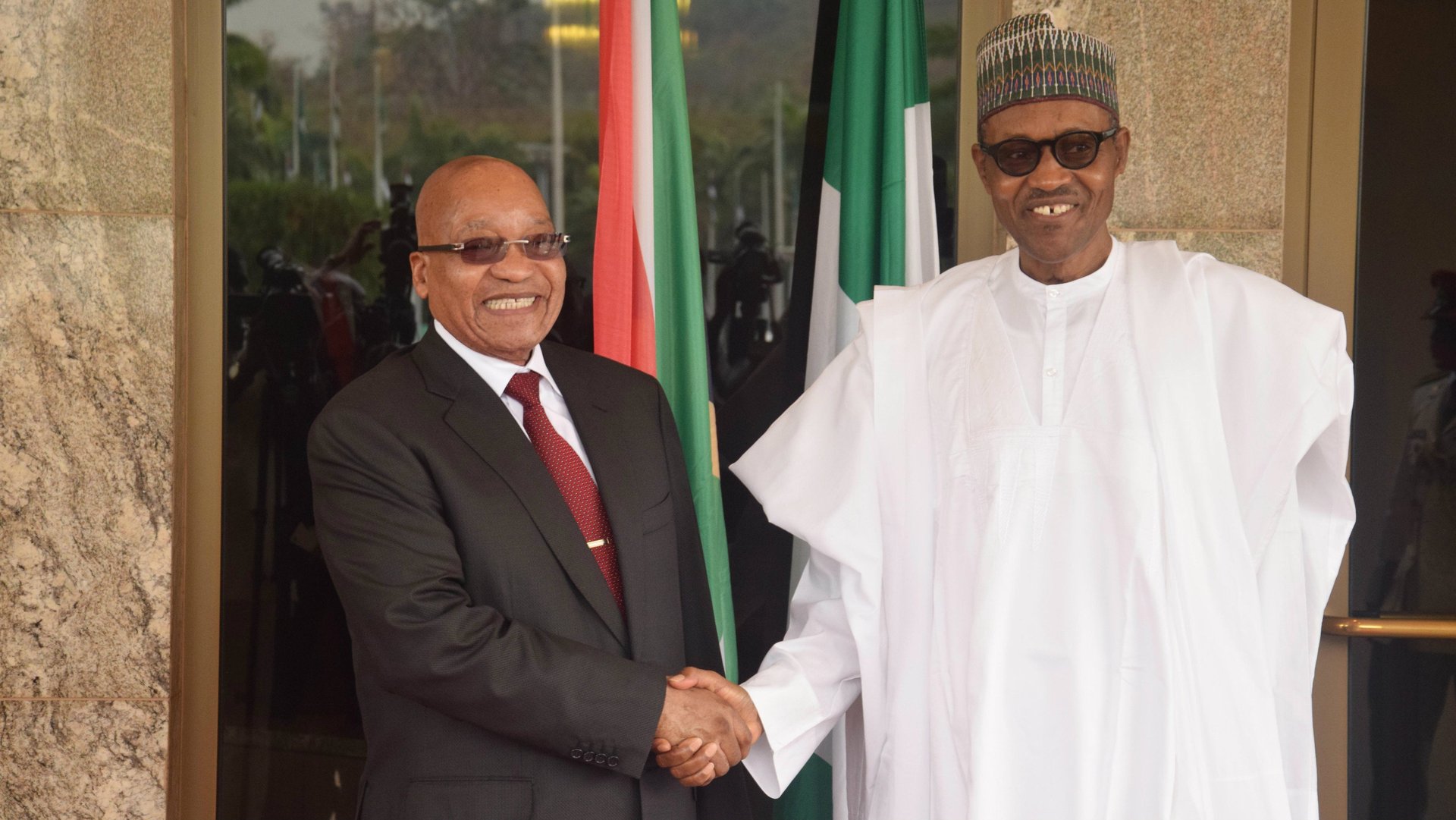Trump’s first diplomatic contact with sub-Saharan Africa is with two presidents also facing protests at home
In his first call with sub Saharan African leaders on Feb. 13, US president Donald Trump chose to dial up two of the continent’s embattled presidents—Nigeria’s Muhammadu Buhari and South Africa’s Jacob Zuma.


In his first call with sub Saharan African leaders on Feb. 13, US president Donald Trump chose to dial up two of the continent’s embattled presidents—Nigeria’s Muhammadu Buhari and South Africa’s Jacob Zuma.
Both men, presiding over the continent’s largest economies, have faced public dissent in the past week. Across major cities in Nigeria, protests were held decrying difficult living conditions amid Nigeria’s economic recession. Jacob Zuma, on the other hand, saw his State of the Nation speech delayed and disrupted by opposition members of parliament who repeated long-running allegations of corruption against Zuma.
Trump, who spoke with Egypt’s president Abdel Fattah al-Sisi back in November, has shown little to no interest in Africa as a candidate over the last year or in the first few weeks of his presidency till now.
Friends-in-arms
Niceties aside, the main thrust of Trump’s conversation with Buhari, who received the call from London where he remains on an extended sick leave, was improving cooperation to fight terrorism. For much of the past decade, terrorist sect Boko Haram has led an insurgency resulting in more than 20,000 deaths and the displacement of millions across Nigeria’s northeast.
Trump commended Buhari’s progress in the fight against Boko Haram, particularly securing the release of some of the Chibok schoolgirls kidnapped by Boko Haram in 2014, according to a readout released by Nigeria’s presidency.
Crucially, Trump also signaled a change in tack from recent US foreign policy by suggesting he is ready “to cut a new deal in helping Nigeria in terms of military weapons to combat terrorism.”
Under the Obama administration, the US refused to sell weapons to Nigeria to aid its fight against Boko Haram. Much of the US’ refusal was down to damning reports of human rights abuse by Nigeria’s military including arbitrary arrests, detention and killing of civilians (an Amnesty International report (pdf) released in June 2015, pegged the number of civilians who have died in military detention at 7,000).
But with Trump and Buhari discussing stepping up anti-terrorism cooperation “through provision of necessary equipment,” Nigeria may soon be able to count on more US support. While Buhari’s government has recorded major success in the fight against Boko Haram, the terrorist sect remains capable of guerrilla-style attacks like the recent bombing of the largest university in Borno, a state in Nigeria’s northeast.
Mutual friend
For their part, all day, South Africans speculated what the trans-Atlantic call between Trump and Zuma could entail, from the serious to the downright absurd, like both presidents’ questionable gender relations to their insistence on keeping their adult children close to the corridors of power.
In the end, Trump’s call to Zuma focused on trade between the US and South Africa. Africa’s most advanced economy already hosts six hundred American companies, according to a statement from the South African presidency.
The South African president’s office said he and Trump “reaffirmed their commitment to strengthening the already strong bilateral relations between the two countries.” Trump and Zuma also agreed to work together toward peace and stability on the continent, reaffirming South Africa’s role as one of Africa’s strongest diplomatic players.
Trump and Zuma already share a friend on the international stage in Vladimir Putin. Trump’s chummy relationship with Putin is already well documented. Zuma’s relationship with Putin goes beyond BRICS, to a controversial deal that could see South Africa ignore its abundant green energy resources for nuclear power plants built by a Russian company.